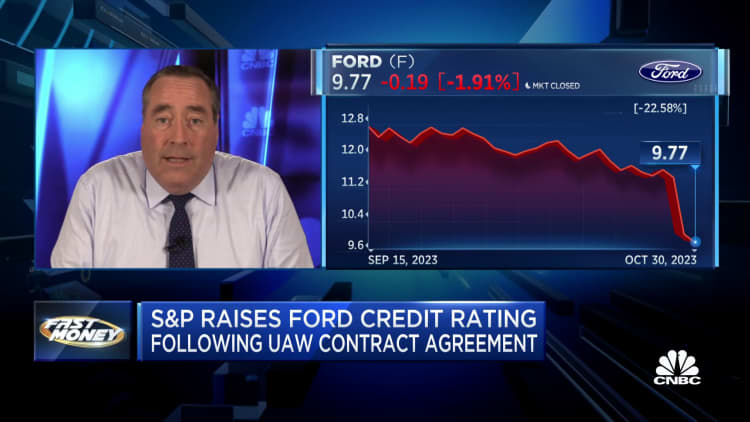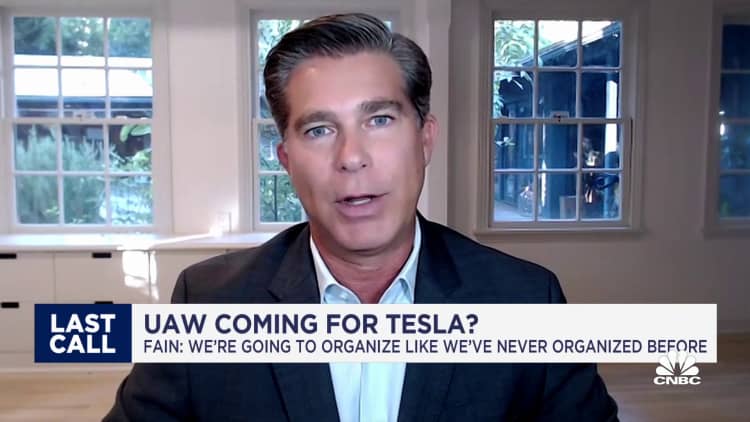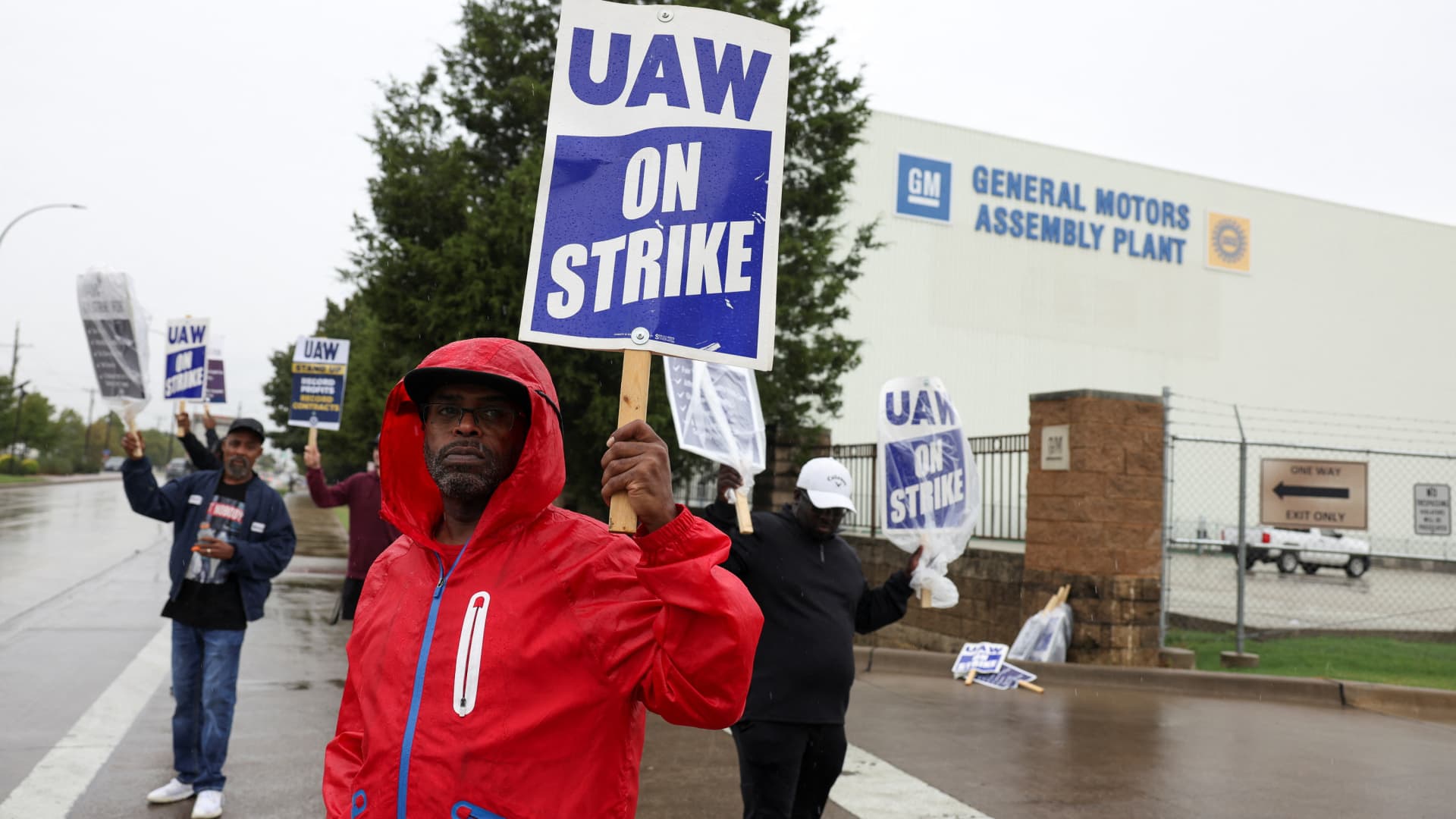United Auto Workers (UAW) members strike at a General Motors assembly plant that builds the U.S. automaker’s full-size sport utility vehicles, in another expansion of the strike in Arlington, Texas, October 24, 2023.
James Breeden | Reuters
DETROIT – General Motors plans to invest roughly $13 billion in U.S. facilities by April 2028, the United Auto Workers union said as part of its recent tentative agreement with the automaker.
GM has already announced some of the planned investments such as $4 billion at Orion Assembly in suburban Detroit and $2 billion in Spring Hill, Tennessee, for new electric vehicles. Others, such as $1.25 billion for a future electric vehicle plant at Lansing Grand River, are new.
Many of the new investments include hundreds of millions of dollars for assembly plants to support or add additional volume as well as engine and components plants.
Details of the tentative agreement were released Saturday after local UAW leaders with GM approved the pact, which must still be ratified by a simple majority of the union’s 46,000 members with the automaker. GM was the last Detroit automaker to reach a tentative agreement following Ford Motor and Chrysler-parent Stellantis.
GM’s U.S. investments through the terms of the 4 ½-tear tentative compared to $8.1 billion announced by the union at Ford and $18.9 billion at Stellantis, including $6.2 billion in previously announced parts plants in Kokomo, Indiana.
GM declined to comment on the released details, referring back to a statement by CEO Mary Barra when the tentative deal was initially announced: “GM is pleased to have reached a tentative agreement with the UAW that reflects the contributions of the team while enabling us to continue to invest in our future and provide good jobs in the U.S.,” she said. “We are looking forward to having everyone back to work across all of our operations, delivering great products for our customers, and winning as one team.”

The tentative labor agreement was announced Monday after roughly six weeks of targeted strikes by the union against GM, Stellantis and Ford, also known as the “Big Three” automakers. The work stoppages began on Sept. 15 after the sides failed to reach deals covering 146,000 UAW members with the automakers by a strike deadline.
“There’s a reason why the Big Three and their allies feel like they just got taken to the cleaners. This contract has wage increases and economic gains like nothing we’ve ever seen before, said UAW Vice President Mike Booth during an online broadcast Saturday. “The gains in this contract are worth more than four times the last contract.”
Like the UAW’s tentative agreement with Stellantis and Ford, the deal includes 25% pay increases, bonuses and other enhanced benefits for autoworkers, such as profit-sharing payments and a $5,000 ratification bonus.
The 25% raises include an 11% increase upon ratification, followed by a 3% bump-up in the next three years and then a 5% increase in September 2027.
At GM, the union also made major gains in cutting down different tiers, or levels, of workers to be paid the same or similar to their traditional colleagues at assembly plants. UAW President Shawn Fain said some workers will receive an immediate raise of 89% if ratified by members.
“One of our central goals in this round of negotiations was the elimination of tiers,” Fain said during the broadcast. “While we didn’t win everything, we made enormous strides at GM. We did more to eliminate wage tiers than any of the Big Three.”
New workers added to the agreement include employees at GM’s Ultium Cells joint venture for battery cells, Fain reconfirmed Saturday. The battery workers will receive a raise of between $6 and $8 an hour, he said.

Fain on Saturday reiterated the union’s plans to use the record contracts with GM, Ford and Stellantis as leverage to unionize other automakers.
“We aren’t bashful or quiet about what our plans are: Our goal is to spend the next few years organizing auto workers across this country,” Fain said. “The Big Three aren’t the only auto companies making record profits. Auto workers at Toyota, Honda, Volkswagen, Hyundai and Tesla, they deserve record contracts. too.”
Toyota Motor earlier this week announced plans to hike wages at its U.S. factories. The new rates would see hourly manufacturing employees at top rates in Kentucky receive roughly 9% pay increases to $34.80 an hour – still below the more than $40 an hour top rate under the UAW’s tentative agreements with the Detroit automakers.
UAW members at Ford have already started voting on that tentative agreement. Most notably, 82% of workers at Ford’s Michigan Assembly Plant voted in support of the pact this week. The suburban Detroit plant was among the first to strike alongside other assembly plants with GM and Stellantis.
UAW members with Stellantis and GM are expected to vote on the deals over the next couple of weeks.

